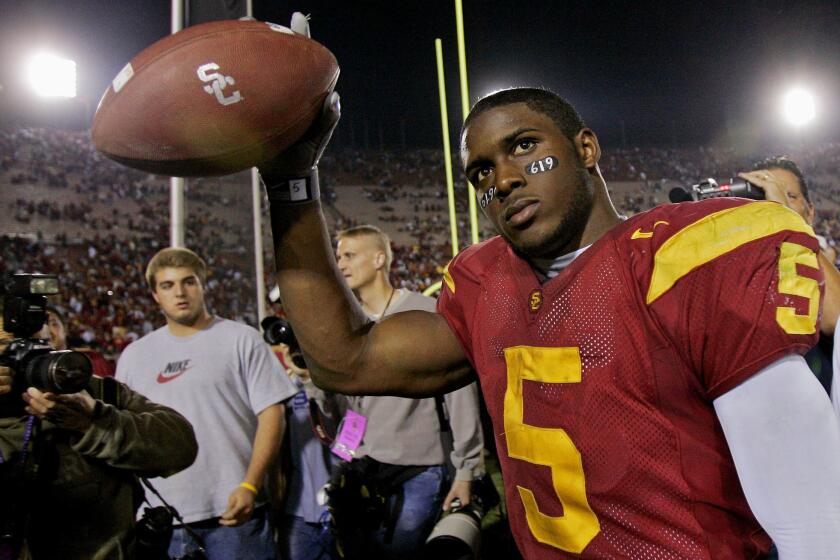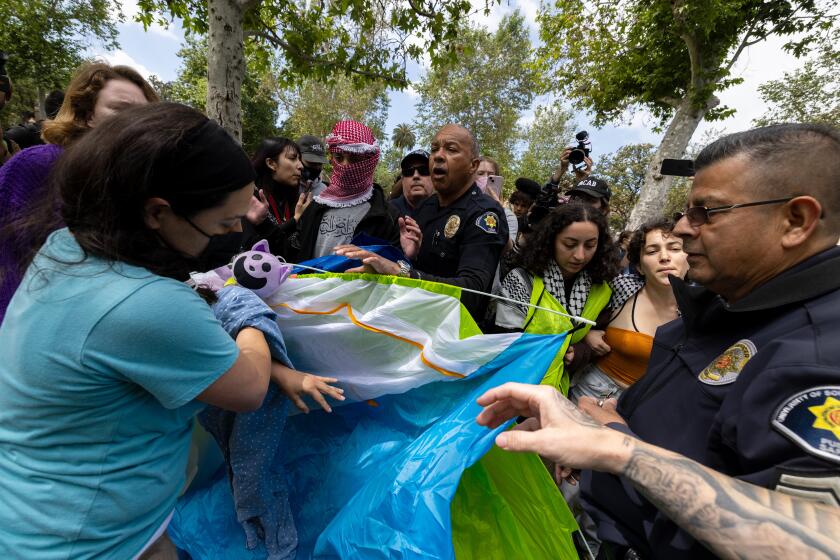Protecting L.A.’s pocket
Anschutz Entertainment Group President Tim Leiweke is the sort of salesman who could sell air conditioning to Eskimos. It’s no surprise, therefore, that the simple souls who occupy the seats on the City Council’s Trade, Commerce and Tourism Committee appear to have been dazzled by his offer this week to join in AEG’s efforts to build a professional stadium adjacent to its Staples Center and L.A. Live entertainment complex in South Park.
After Leiweke appeared before the committee Wednesday to sell his proposal, the panel passed a series of motions requesting that the full council establish a working group to negotiate the details of a stadium agreement with AEG, which has said it would like to have an arrangement approved by the end of March.
Councilwoman Janice Hahn, who chairs the committee, said, “We’re going to be cheerleaders, but we’re also going to have watchdogs on this proposal.”
They’d better be particularly sharp-eyed beasts, because while AEG’s proposal is creative and worth considering seriously, it’s also true that whom the gods of municipal government would destroy, they first make mad over National Football League franchises. Moreover, it’s also true that — whatever the merits of Leiweke’s plans — billionaire real estate magnate Ed Roski has a perfectly good and far less complicated football stadium proposal approved and ready to begin a few miles east in the City of Industry.
City Hall’s response to AEG’s stadium proposal ought to turn on the question of whether public money will be required for it to proceed. Leiweke emphatically says that it will not. Strictly speaking, that’s correct, though a kind of public subsidy is involved. AEG proposes to demolish the West Hall of the perennially underperforming L.A. Convention Center and build a new hall on Pico Boulevard. A stadium with a retractable roof and the capacity to hold 64,000 to 72,000 spectators, depending on configuration, would go up where the current hall stands. That land is owned by the people of Los Angeles, so there’s a public interest there.
AEG also wants the city to issue $350 million in bonds to cover the costs of demolishing and replacing the West Hall. Leiweke has pledged that all the costs of repaying the bonds will be covered by the stadium’s revenue. That will need to be formalized absolutely, though why an outfit like AEG, with pockets deeper than the Marianas Trench, needs access to the low-cost municipal finance market is another question.
Just to add to the complexity, city administrative analyst Jason Kileen says that L.A. still owes at least $440 million on the bonds it issued to build the West Hall. That sum has to be repaid before the building can be demolished, and it’s not at all clear that this can be done legally as part of another bond issue.
Unlike Roski’s Industry proposal, Leiweke’s envisions starting construction of a downtown stadium without a firm commitment from an NFL franchise. It’s hard to tell whether AEG is just gambling or trying to scare Roski out of the competition. In any event, there isn’t going to be any decision until after the league’s current labor troubles are resolved, which could take a year if there’s a lockout and strike over the owners’ demands that the players accept a double-digit salary cut, despite the fact that all of its franchises are profitable.
There’s a reason for that, and a reason that all 32 NFL franchises made this year’s list of the world’s 50 most valuable sports franchises. (The Oakland Raiders, pro football’s least valuable team, still is worth more than either the Dodgers or the Lakers.) If the average Fortune 500 company were run with the brutal venality of the average NFL franchise, capitalism would have collapsed decades ago. This city’s main value to the league is as a threat to hold over cities whose existing teams want new stadiums with public subsidies. Give us what we want, or we’ll move to Los Angeles.
You can bet this crowd is salivating over the prospect of playing Leiweke’s and Roski’s proposals off against each other. Over the last decade and a half, we’ve seen a lot of great salesmen depart LAX promising to bring back an NFL franchise and, somehow, they all come back looking rather like Willy Lohman after that last trip upstate.
More to Read
A cure for the common opinion
Get thought-provoking perspectives with our weekly newsletter.
You may occasionally receive promotional content from the Los Angeles Times.






